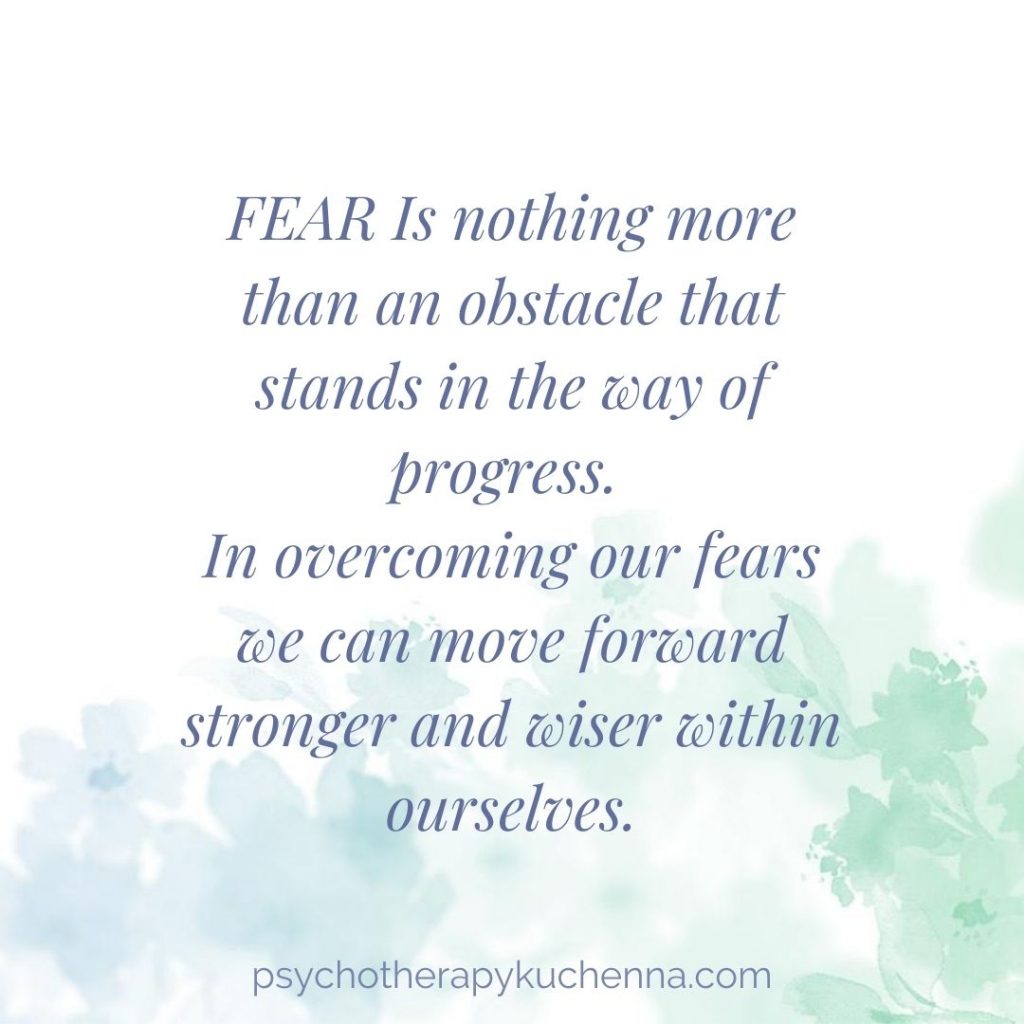Fear has two meanings: Forget Everything And Run OR Face Everything And Rise. The choice is yours.
It’s a given that fear is part of the human experience, but where does it come from and why does it sometimes dominate your life? How do some people navigate through the fear and come out the other end not only intact but even happier? Yes, it’s possible that the best things in life are on the other side of fear.
Perhaps it’s not fear itself that you need to be afraid of, but how you carry the fear. Fear will always be a part of your life, but it doesn’t have to be in the way that you may think. What if you turn fear into a motivator? How different your life could be!
What Is Fear?
Here is a helpful acronym:
- False
- Evidence
- Appearing
- Real
Your fears may be countless and their roots can be deep and difficult to overcome. However, most often they are steeped in irrational thought, having you believe things that obstruct you from living life to the fullest. This is not to negate what you are experiencing as something that can be easily tossed aside. Your fears are real to you. Your body is alerting you to something that is wrong and this shouldn’t be ignored. The challenge becomes learning how to identify the type of fear you experience. Identifying means you must face the fear and get to know it.
At its most basic level, fear can be categorized into two types: survival and irrational. Survival fear is anything you experience to help you stay alive such as the feeling when approaching the edge of a cliff or facing a predator. An example of irrational fear is when your dreams of becoming an artist, dancer, or teacher are thwarted by the feeling of grave danger. Once identified, appropriate steps can be taken to begin navigating through the emotion.
Fear vs. stress
You routinely deal with stressful situations that can be external (for example, a new job or being stuck in traffic) and/or internal (worrying about something from the past or future). In these circumstances, you know your life is not in danger, but the area of the brain responsible for sounding the alarm does not know the difference. The amygdala and the rest of your body do its job well. Your body prepares itself to fight or flee the scene whether it’s for survival or a common stressor—it all feels all the same internally.
Some individuals live in fight-or-flight mode. Imagine what this does to your mind and body over time. This primal stress reaction was put in place as a temporary response to danger, not as a prolonged state of being. Chronic stress is a major problem and is the precursor to many mental and physical illnesses—including addiction. The world is stressful. There is much pressure to perform and succeed and it’s often accompanied by the familiar feeling of fear—of failure, of succeeding, of change, of being judged, of being rejected, and so on.
Fear limits you in every possible way. As you feel your body constricting and tensing, the same happens within your mind. It becomes hard to see beyond to other possibilities, confining attention and energy to only what’s in front of you. You are familiar with self-talk that plays over and over in your mind and the accompanying feelings when confronting something that is uncomfortable. You must learn this to acknowledge that this is not representative of the real you.
Overcoming fear
The first step to overcome fear is to acknowledge it. Most of your fears and insecurities are illogical, so writing a list of the reasons why you are reluctant to make a change can be very helpful.
After the fear is recognized and identified comes the hard part. You have to prepare your mind to make the change, with no regrets. To do this, think about the worst case scenario (if all goes wrong), because it helps put things in perspective (usually, you realize that the world will not end.) You must also build the necessary commitment to go for making the change—talk about your intentions, make it public, believe it, and think of a reward for when you are done.
So one last thing: commit to a decision and act. What’s important to note is that inaction feeds and grows fear, but acting increases your confidence and makes the fear subside.
When you face a change in your life, it is normal to be afraid. It is not about avoiding fear but accepting it and making the switch in spite of it. Don’t worry if you feel that familiar pit in your stomach, you’re on the right way.
One of my favourite psychoanalyst Carl Jung once said:
“Only one who has risked the fight with the dragon and is not overcome by it wins the hoard, the “treasure hard to attain.” He alone has a genuine claim to self-confidence, for he has faced the dark ground of his self and thereby has gained himself.”
Ways to use fear as motivational fuel
Think about the most successful people around you; and those who know what they are aiming at. These people are no different from you. They also face sad events, feel the fear of losing something and have their insecurities. People who convey messages about overcoming our fears do so with good intentions, but have they ever thought about how fear can be used as a motivational fuel in your life?
Fear is part of the human experience. We have some inbuilt fear in us. The question is how we can make sure that our fears do not prevent us from succeeding?
Concentrate on what you can influence – When fears slip in, do not give in to them. Concentrate on what you can control.
Focus on the future – Forgive yourself for the mistakes that you made, we need in order to grow as a person. Release your luggage so you can move forward.
Think like great people – Mario Andretti said:If everything seems under control, you will not go fast enough. That means you have to experiment; no business can prosper if it can manage the storm. You need the power to resist a storm.
Make your comfort zone uncomfortable – Everybody likes their comfort zone, but in that place, there is very little room for growth. No one likes to step out of their comfort zone to make an extra effort. Well, to succeed, you need to develop habits that will help your personal growth.

https://www.psychologytoday.com/us/blog/the-main-ingredient/200909/the-most-powerful-motivator
https://medium.com/@christopherhorruitiner/on-the-fear-as-motivation-paradigm-fb4bd2ca37c7

